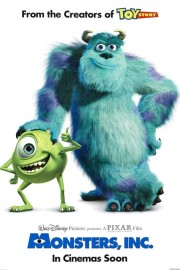Monsters, Inc.
It’s been a long time since I’ve watched “Monsters, Inc.” without the wonderful audio commentary, so seeing it again as “Monsters University” hits theatres, I forgot how aggressive the film is in terms of style. For a while, it was my least favorite Pixar film, which is to say, I didn’t enjoy it quite as much as I did the other films the studio has made. (It’s since been supplanted by “Cars 2.”) However, reacquainting myself with the film sans commentary, I was reminded not just how embarrassingly sweet the relationship between Sulley (John Goodman) and Boo, the human child trapped in the monster world, is, but how ridiculously funny it is.
This is one of the few, pure “comedies” I would say Pixar has ever made, where story– while important –takes a back seat to visual and verbal gags; “A Bug’s Life,” which has always been one of my favorite Pixar films, is the only other one I can think of in those terms. There are so many to choose from: the constant torture of George, who starts with one “2319” (a contamination breach from the human world), and progresses from there; the personality of the snakes that make up Celia’s hair; the opening sequence, where a monster fails riotously when it comes to scaring in the training simulator; Sulley and Mike Wazowski (Billy Crystal) trying to sneak Boo back into Monsters, Inc., and honestly, pretty much any moment with the two of them, in general; and, of course, there’s the scene where Mike and Sulley are banished, and run into The Abominable Snowman (John Ratzenberger), who has a thing for snowcones. With a film like this, the more adult-geared storytelling of “Finding Nemo,” “Up,” “Wall-E,” and even the “Toy Story” trilogy, is an afterthought to making audiences laugh, and screenwriters Andrew Stanton and Daniel Gerson, and director Pete Doctor, do just that in high fashion.
The story, for those who may not remember, revolves around Sulley and Mike, a couple of workers at Monsters, Inc., an industrial factory that specializes in collecting children’s screams as a source of energy. Those monsters we thought were in our closet as a child? Turns out they’re real, and they did what they did not because they wanted to, exactly, but because they had to in order to keep their society functioning. This has always been the specialty of Pixar– take an idea we’re familiar with, and make it the catalyst for a story that delves head-long into funny, emotional situations we can all relate to. There’s a twist to this story, however; as important as children’s screams are to the monsters, they’re also afraid of the human world, and have some pretty silly notions of how toxic our world is to theirs. But the threat that Boo, who is brought into their world by a rival scarer, Randall (Steve Buscemi), poses to their universe is an important part of the story, almost as important as the threat it poses to Mike and Sulley’s friendship, which drives the second act of the film. Seeing the evolution of Sulley’s feelings towards Boo grow, and watching the wedge it puts in his friendship with Mike, is the beating heart of the film, which moves at a breathless pace up to one of the most moving final shots Pixar has ever come up with.
It’s the laughs had along the way, however, that keep me coming back to “Monsters, Inc.” over the years, commentary or not. This is just, plain fun, first and foremost, and animated with color and imagination. Most memorable in both comedic and visual value is the sequence where Mike, Sulley, and Boo find themselves being chased by Randall in the warehouse where the childrens’s doors are kept, and the scene is a roller coaster of animation brilliance that could only be executed so well in computer animation. The four go through door after door, and find themselves sometimes between the two worlds at the same time, and it’s an exhilarating sight, scored with excitement by Randy Newman (who finally won his first Oscar for his song, “If I Didn’t Have You,” for this film), who does some of his best work for Pixar with this movie. In the end, it lacks the resonance of the studio’s best work, but it makes up for it with a comedic center that is focused and fantastic fun to revel in. That’s something you can almost always count on Pixar for.










